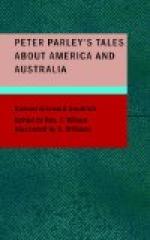Such was the cruelty and oppression with which the Spaniards treated the Indians, and so intolerable the burden imposed upon them, that they at last took arms against their oppressors; but these insurrections were not formidable. In a conflict with timid and naked Indians, there was neither danger nor doubt of victory.
A mutiny which broke out among the Spaniards, was of a more dangerous nature, the ringleader in which was Francisco Roldan, whom Columbus, when he sailed for Spain, had appointed chief judge, and whose duty it was to have maintained the laws, instead of breaking them.
This rebellion of Roldan, which threatened the whole country with ruin, was only subdued by the most wise and prudent conduct on the part of Columbus; but order and tranquillity were at length apparently restored.
As soon as his affairs would permit, he sent some of his ships to Spain, with a journal of the voyage which he had made, and a description of the new continent which he had discovered, and also a chart of the coast along which he had sailed, and of which I shall have something more to tell you presently.
He at the same time sent specimens of the gold, the pearls, and other curious and valuable productions which he had acquired by trafficking with the natives.
He also transmitted an account of the insurrection in Hispaniola, and accused the mutineers of having, by their unprovoked rebellion, almost ruined the colony.
Roldan and his associates took care to send to Spain, by the same ships, apologies for their mutinous conduct, and unfortunately for the happiness of Columbus, their story gained most credit in the court of Ferdinand and Isabella.
By these ships Columbus granted the liberty of returning to Spain to all those, who, from sickness or disappointment, were disgusted with the country. A good number of such as were most dissatisfied, embraced this opportunity of returning to Europe. The disappointment of their unreasonable hopes inflamed their rage against Columbus to the utmost pitch, and their distress made their accusations be believed.
A gang of these disorderly ruffians, who had been shipped off to free the island from their seditions, found their way to the court at Grenada. Whenever the king or queen appeared in public, they surrounded them, insisting, with importunate clamours, on the payment of arrears due to them, and demanding vengeance on the author of their sufferings.
These endeavours to ruin Columbus were seconded by Fonseca, who was now made bishop of Badajos, and who was entrusted with the chief direction of Indian affairs. This man had always been an implacable enemy of Columbus, and with others of his enemies who were about the court, having continual access to the sovereign, they were enabled to aggravate all the complaints that were urged against him, while they carefully suppressed his vindications of himself.




